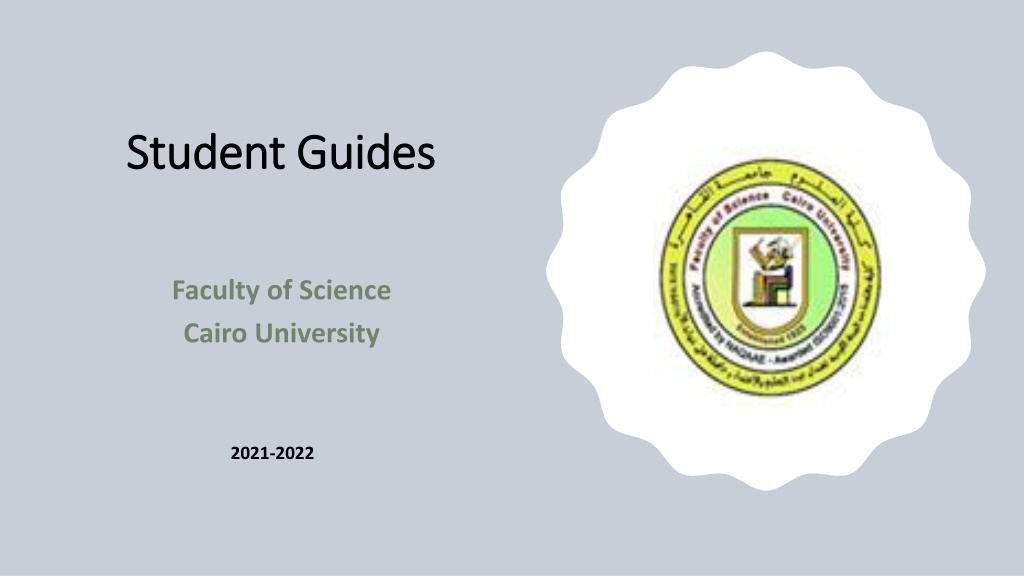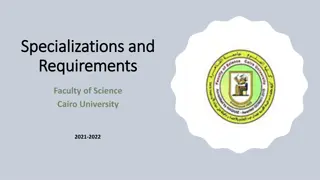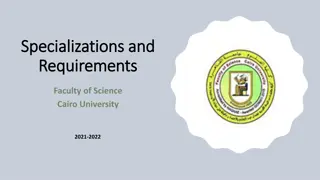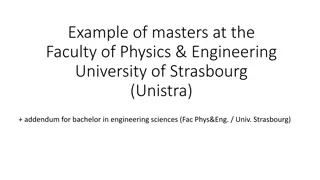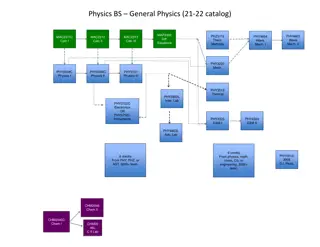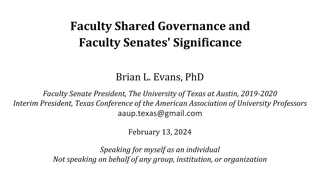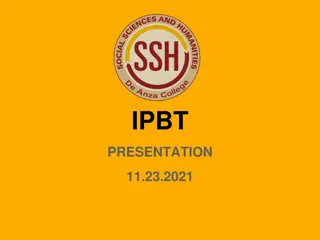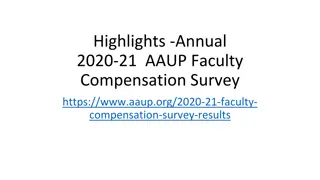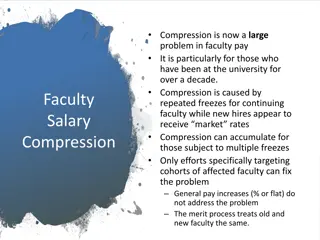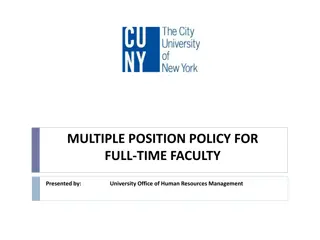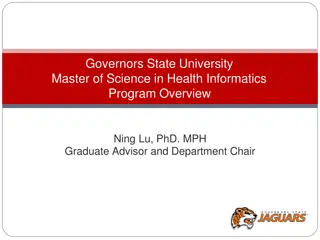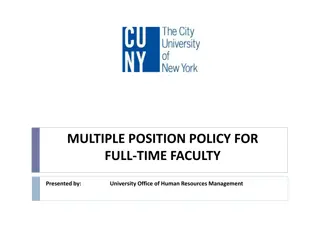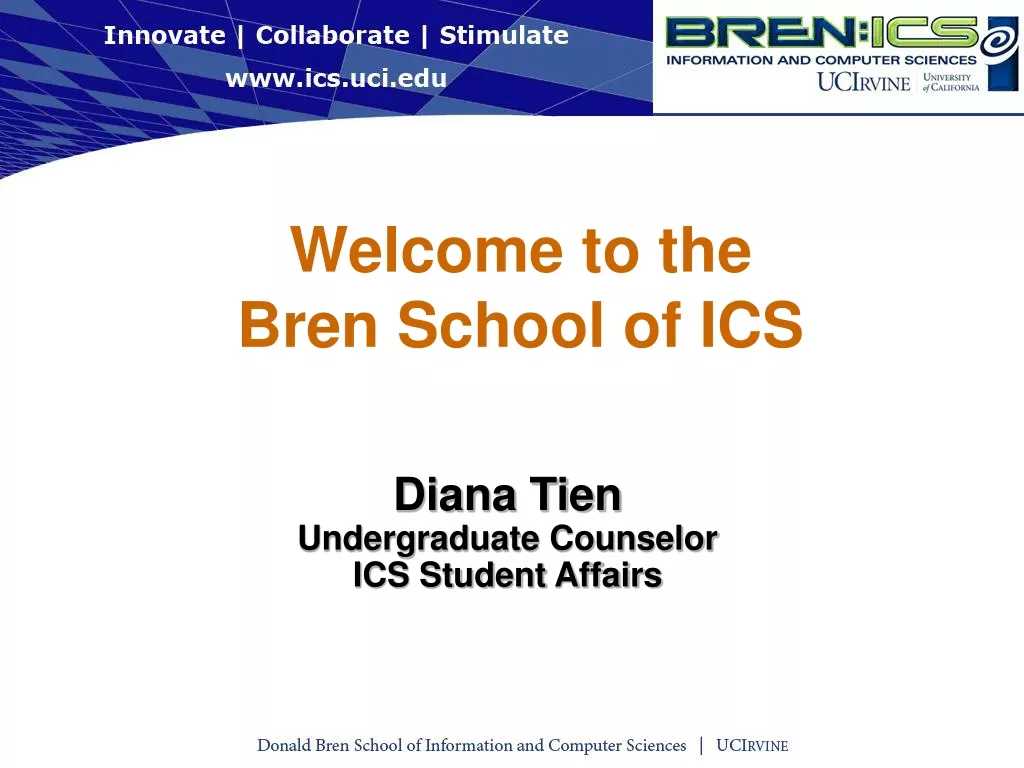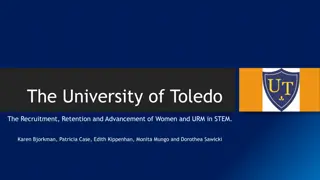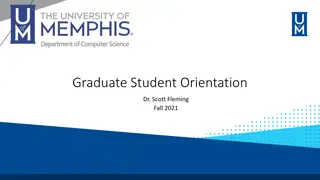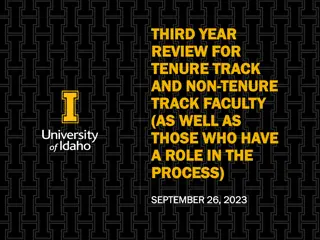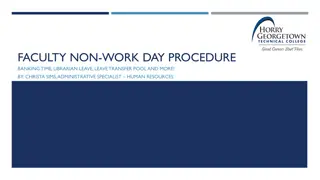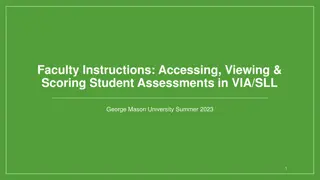Overview of Specializations Offered in the Faculty of Science at Cairo University
The Faculty of Science at Cairo University offers a variety of specializations for undergraduate students, including single and double specializations in disciplines such as Mathematics, Physics, Chemistry, Botany, Zoology, Geology, and more. Students can choose from a range of specializations based on their interests and academic background, with options for both Math and Science sectors. The degree offerings align with the executive protocol of Universities Regulation Law, providing students with a diverse and comprehensive educational experience.
Download Presentation

Please find below an Image/Link to download the presentation.
The content on the website is provided AS IS for your information and personal use only. It may not be sold, licensed, or shared on other websites without obtaining consent from the author. Download presentation by click this link. If you encounter any issues during the download, it is possible that the publisher has removed the file from their server.
E N D
Presentation Transcript
Student Guides Student Guides 2021-2022
The Protocol of the Credit Hour System The Protocol of the Credit Hour System for Undergraduates for Undergraduates in Faculty of Science, Cairo University in Faculty of Science, Cairo University
Article (1) The Faculty includes 10 Departments: Mathematics Department. Physics Department. Chemistry Department. Botany Department. Zoology Department. Geology Department. Entomology Department. Astronomy and Meteorology Department. Biophysics Department. Geophysics Department.
Article (2) According to the faculty board, the university grants 26 Scientific Degree (BSC Science) in the following specializations: 12 single specialization and 14 double specialization. The faculty takes students from high school (science and math sectors). Students can be specialized from the 2nd year to one of the following specializations:
Specializations for students belongs to Math sector Specializations for students belongs to Science sector Specializations for students belongs to both sections Mathematics Computer Science Statistics (frozen course) Mathematics /Statistics Mathematics /Computer Science Mathematics /Astronomy Chemistry/Zoology Chemistry/Entomology Chemistry/Botany Chemistry/Microbiology Chemistry/Biochemistry Geology Physics/Astronomy Physics/meteorology Geophysics Chemistry/Geology Physics Communication physics (frozen course) Mathematics /Physics Physics Astronomy Biophysics chemistry Chemistry/Physics Geo-Petrolium Science (with Fees) Space science Biotechnology (with Fees) in accordance with the rules of the executive protocol of the Universities Regulation Law.
Article (3) The B. Sc. special degree (single specialization) is granted in the following specializations: Chemistry. Mathematics. Statistics. Computer Science. Physics. Communication Physics. Biophysics. Astronomy. Space Science. Geology. Geophysics. Other single specializations are established in accordance with the rules of the executive protocol of the Universities Regulation Law.
Article (4) The B. Sc. general degree (double specialization) is granted in the following specializations: Chemistry/Physics. Chemistry/Geology. Chemistry/Zoology. Chemistry/Botany. Chemistry/Microbiology. Chemistry/Biochemistry. Chemistry/Entomology and Environmental Health. Physics/Mathematics. Physics/Astronomy. Physics/Meteorology. Mathematics/Astronomy. Geology/Geophysics. Other double specialization could be established according to the rules of the executive protocol of the Universities Regulation Law.
Specialized Scientific Program (SSP) Petrolium Sciences Biotechnology/Molecular Biochemistry Requirements: Requirements: - Get the grades prerequisite to the faculty through - Get the grades prerequisite to the faculty university coordination office through university coordination office - 90% in English - 90% in English - Pass interview with faculty staffs, representatives - Pass interview from companies and scientific centers. - Selection according to the highest grades - Selection according to the highest grades (high (high school) in both Chemistry and Physics school) in both Mathematics and Physics
Article (5) The credit hour system (2 semesters) is the system of study adopted by the Faculty.
Article (6) The period of study to obtain a B. Sc. degree is 4 academic years, according to the article 48 in the executive protocol of the Universities Regulation Law. Through this period, 4 study levels are attained. Each level covers two semesters, intervened by the midyear vacation.
Article (7) The academic semester extends for 17 weeks including: a) One week for registration. b) 14 weeks of study. c) Two weeks for the exams. The first semester starts every year by the 3rd Saturday of September.
Article (8) Credit hour definition: a- For lectures: A credit hour equals a weekly hour lecture during the academic semester. b- For practical and applied periods: A credit hour equals an applied or practical period of 2 or 3 hours/week during the academic semester.
Article (9) I- Requirements for The B. Sc. graduation are: 1) 8 credit hours as University requirements including the following: A) 2 credit hours for computer sciences. B) 2 credit hours for English language. C) 2 credit hour course for human rights. D) 2 credit hours for humanities in one of the following: Principles of Management and Accounting, Islamic culture, Arabic language, Introduction to law, Environmental culture, History and Philosophy of Science.
Article (9) cont. II- 30 credit hours as Faculty requirements, all through in the first level and include: A)18 credit hours equally divided among Chemistry, Physics and Mathematics. B)12 credit hours for: Geology, Zoology, Botany, Entomology, Biology, Astronomy and Space Science, Mechanics, Algebra, Biophysics, Geophysics.
Article (9) cont. III- Specialization requirements: A) For the award of the special B. Sc. degree (single specialization), 108 credit hours are determined by the concerned department. B) For the award of the General B. Sc. Degree (double specialization), 108 credit hours are equally divided between the two major (specialization) subjects. C) All students should perform a six weeks training period in one of the institutions related to his/her specialization during summer vacation in consultation with the academic adviser (No credit given).
Article (10) Registration, academic load and courses: 1- Registration: A) The Vice Dean for Education and Students' Affairs (VDESA) supervises the execution of the rules and procedures of registration including of the preparation of subject groups, lists, study time-tables, and directing students to their academic tutors, issuing the student form of each subject and form for all subjects.
Article (10) cont. 1- Registration (cont.): B) All academic data are to be introduced in special official records. Registration should be completed by the first week of the semester. C) For those students who were unable to register in due time because of forcible reasons accepted by the Committee of Student Affairs, they can register through the 2nd week of the semester.
Article (10) cont. 2-Academic tutoring: Every student should have an appointed academic tutor to help him/her in selecting subjects and determining the number of credit hours registered according to his/her conditions and abilities, as well as helping solve his/her problems. All data are to be recorded in a student form. The tutor has to review the subjects registered by the student in every semester until graduation.
Article (10) cont. 3- Study (Academic) load: A) The student is allowed to register for maximum 18 and minimum 14 credit hours in each semester, except in the following conditions: B) Distinguished or highly performing students (with a cumulative average of 3.0 or higher) may register in additional elective (optional) courses, from the requirements of his/her specialization, offered by the different departments of the faculty. This is limited to a maximum of 8 credit hours (2 credit hours in every semester) throughout the study period and the grades are added to the general cumulative average.
Article (10) cont. 2- Study (Academic) load (cont.): C) The study load may be increased in the final semester in order to meet the graduation requirements, based on the approval of the Faculty Board. D) A student with a cumulative average of 1 (for two successive semesters) is not allowed to register in more than 12 credit hours per semester.
Article (11) Additions, omission, withdrawal and major shifting (changing specialization): 1) Subject to the approval of the academic tutor, a student may add or omit one course or more, not after the end of the 4th week of the academic semester taking in consideration the study load (article 10. 2) A student may drop a course by the 6th week of the semester, as recommended by the academic tutor. The course will be included in the student s academic record with grade withdraw provided that the student does not exceed the allowed times of absence before withdrawal.
Article (11) cont. Additions, omission, withdrawal and major shifting (changing specialization): 3) A student is allowed to modify (change) his specialization, provided that he/she fulfills the requirements of the desired specialization. The credit hours he/she has passed before the major shiftting in inconsistent fields will not be counted. Such modification (change) should get the consent of the academic tutor and the Committee of Education and Students Affairs (CESA).
Article (12) The student must submit to the rules of the University and Enrollment Faculty, regarding dismissal, chances of rejoining (enrollment), accepted excuses for not attending the exams, freezing, and all rules pertaining to students' discipline, referred to in Article 123 in the executive protocol of the Universities Regulation Law.
Article (13) Attendance 1) The course instructor reports student attendance, at the beginning of each lecture or practical period, in an attendance sheet prepared by Eduation and Student Affairs Administration (ESAA), considering the following: 2) Allowed absence for a student, with no excuse, is 10% of the total course hours. The course instructor will notify the (ESAA) when the student exceeds the percentage of absence, and the student will be given the first warning by the (ESAA).
Article (13) cont. Attendance (cont.) 3) If the student's absence reaches 20%, a second and last written warning should be directed to him/her. 4) If the student's absence in the course exceeds 25% with an unaccepted excuse by the CESA and endorsed by the VDESA: the student will be given grade "deprived" in this course. This will be considered as Fail in the cumulative average of the student.
Article (14) Evaluation: Each course is given 100 marks. Lectures and practical periods are evaluated according to the following: For theoretical courses: Term (semester) assessments, which include periodic tests. The answer sheets are handed back to the students. these constitute 40% of the total course marks. 60% of the total course marks are assigned for the final theoretical exam. For practical courses: 80% of the total course marks are assigned for term (semester) assessments, which include periodic tests and 20% of the total course marks are assigned for the final exam.
Article (14) cont. Evaluation (cont.): The final examination is held within the last two weeks of the semester according to a time-table prepared by the ESAA and endorsed by CESA of the faculty. This is announced to students during registration. It constitutes 60% of the total course marks. The final examination for a given course is given by a committee of instructors contributing in teaching the course and headed by a coordinator. The coordinator should have the responsibility of preparing the time-table for term tests and question sheets.
Article (14) cont. Evaluation (cont.): An honors grade is conferred upon the student who gets a cumulative average of 3.0 or higher on graduation under the condition that he/she has never failed in any course during his/her study in the faculty (or in the faculty he/she has transferred from).
Article (14) cont. Evaluation (cont.): The final result of a course may be postponed for no more than one semester, as a result of not fulfilling the requirements because of forcible conditions (not attending the final examination of the course for an accepted excuse). In that case, the student is given a grade of "Incomplete". If the student dose not finish the course requirements by the time of the final exam of the incomplete courses (the first week of the following semester), the student is given a grade (Fail) in that course.
Article (15) Numerical and symbolic counterparts of the degrees and grades. a) Degrees and grades are as follows: Grades Symbols No. of points Degree Excellent A 3.5-5 85% - 100% Very Good Good B 2.5-3.4 1.5-2.4 84% - 75% 74% - 65% C Pass Fail D F 1-1.4 0 64% - 60% - Absent T 0 - Incomplete I 0 - Withdrawal Deprived W F 0 0 - -
Article (15) cont. b) In case of recurring failure of a student in a course, it will be considered once in his/her cumulative average. However, all registration times for the course will remain on his/her academic record. c) Semester average; is the average points gained by a student in a single semester approximated to two decimals only. It is calculated as follows: Sum of semester course points multiplied by its credit hours Semester average = Sum of semester credit hours of those courses
Article (15) cont. d) General Point Average (GPA); is the average points gained by a student during his/her previous study period and approximated to two decimals only. It is calculated as follows: Sum of course points multiplied by its credit hours (GPA) = Sum of credit hours of those courses including fail hours e) The minimal grade for cumulative average for graduation is D.
Article (15) cont. Grades are granted to a student upon graduation as follows: Degrees Points Symbol Grade 85% - 100% 3.5-5 A Excellent 84% - 75% 2.5-3.4 B Very Good 74% - 65% 1.5-2.4 C Good 64% - 60% 1.1.4 D Pass
Article (16) Academic warnings: If the student gets a cumulative average less than D, he/she will receive the first warning of unsatisfactory performance. If this unsatisfactory performance (low cumulative average) recurs, the student is considered under academic follow up and is not permitted to register no more than 12 credit hours per semester.
Article (16) cont. Academic warnings: If this unsatisfactory performance in terms of grades continues for the first 3 semesters, the student will be warned that his/her registration may be terminated (dismissed) and will be given a last chance to register a number of credit hours less than the minimal limit to improve the cumulative average (22 cr.). In case of failure, his/her enrollment will be terminated.
Article (17) Enrollment termination: Enrollment of the student in the Faculty of Science Cairo University is terminated in any of the following conditions: If he/she has benefitted the maximum period of academic follow up as referred to in article (16) of this protocol.
Article (17) cont. Enrollment termination (cont.): If the student's absence exceeds 25% in more than half of the registered courses in any semester, without submitting an excuse accepted by the CESA (article 13). If the student is involved in a misconduct or any activity not complying to the Faculty or University rules and regulations or has been subjected to student discipline protocol in accordance with the University regulations.
Article (17) The rules of this protocol will take effect at the beginning of the academic year following its official approval by the Ministry of Higher Education on: a) Students who are enrolled for the first time in the faculty as freshmen. b) Students failing their first year following the previous protocol.
Article (18) The rules of the Universities Regulation Law and its executive protocol are to be applied in cases not mentioned in this protocol.
